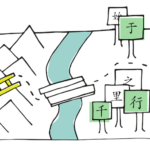Articles in the ‘Beginner’ category Page 13
-
Best of Hacking Chinese 2021
2021 was an eventful year on Hacking Chinese, but which were the best articles? The most popular podcast episodes? Let’s summarise the year that was and highlight things you really shouldn’t miss!
Read → -
A guide to Pinyin traps and pitfalls: Learning Mandarin pronunciation
When learning to pronounce Mandarin, you need to learn both the sounds and how they are written, usually with Pinyin. Did you know that many student errors actually come from a poor understanding of Pinyin, rather than the sounds themselves being difficult? Welcome to my guide to Pinyin traps and pitfalls.
Read → -
How to improve fluency in Chinese by playing word games
What if I told you that there is a game that helps you speak Chinese more fluently, is great for improving communicative ability and works well regardless of your current level? What if I said that the game is also fun and free to play?
Read → -
The building blocks of Chinese, part 6: Learning and remembering compound words
Compound words in Chinese can look confusing at first, but once you see the patterns, learning and remembering them becomes much easier.
Read → -
The building blocks of Chinese, part 5: Making sense of Chinese words
How many characters do you need to know to be able to read Chinese? The truth is that characters only provide a foundation, so regardless of how many you know, you won’t be able to read much unless you also know many words.
Read → -
Why spaced repetition software is uniquely well suited to learning Chinese characters
While spaced repetition software can be very useful, it also has some serious drawbacks. Fortunately, most of them don’t apply to learning to write Chinese characters!
Read → -
The best Chinese reading practice for beginners
The best way to learn to read in Chinese is to read texts you can understand without constantly using a dictionary. As a beginner, such texts aren’t easy to find, but let’s have a look at the best reading resources I know for beginners.
Read → -
6 challenges students face when learning to read Chinese and how to overcome them
Learning to read Chinese comes with several challenges, some of them unique to Chinese. What are these challenges, what do they mean for you as a student and how can you overcome them?
Read → -
Should you enrol in a Chinese course or are you better off learning on your own?
Some people think enrolling in a course is the best way to learn Chinese, but others say that courses are useless, and swear by the effectiveness of self-studying. So should you enrol in a Chinese course or are you better off learning on your own?
Read → -
Why your Chinese isn’t as good as you think it ought to be
Sooner or later, most students realise that their Chinese isn’t as good as they think it ought to be. Why is that and what can you do about it?
Read →









